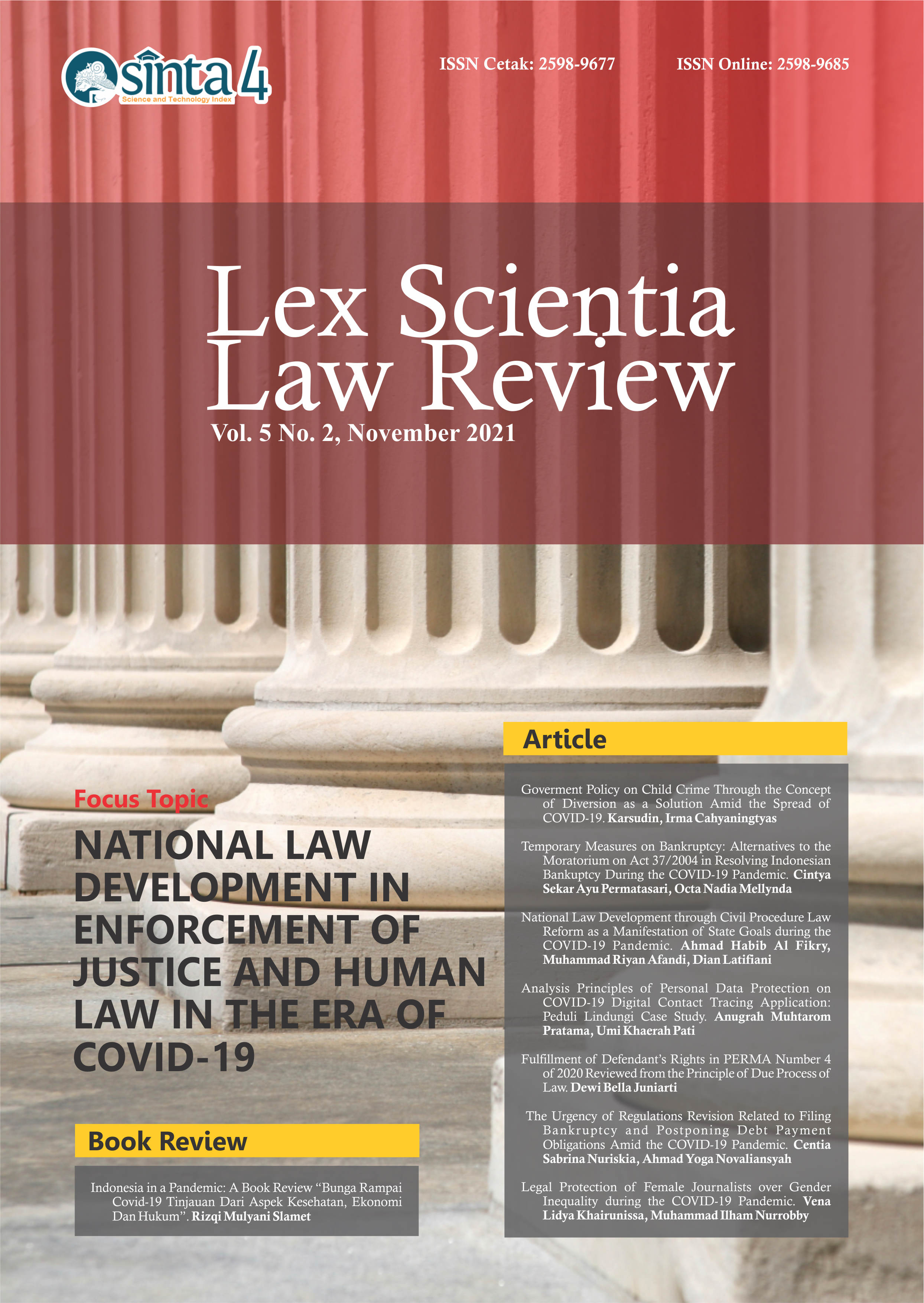Fulfillment of Defendant's Rights in PERMA Number 4 of 2020 reviewed from the Principle of Due Process of Law
Main Article Content
Abstract
The purpose of this study is to find out and analyze the defendant's rights and the obstacles to their fulfillment through the principle of due process of law. The defendant's rights are contained in Supreme Court Regulation Number 4 of 2020 concerning Administration and Trial of Criminal Cases in Courts Electronically. It was considered that during the Covid-19 pandemic, the trial was conducted electronically due to the emergence of public social restrictions. This research was conducted using the juridical-normative method by examining library materials and secondary data through a previous study of laws and regulations, books, and research results. The deviations of the fulfillment of the defendant's rights in the electronic trial from those previously contained in the Criminal Procedure Code occur because of the limited scope regulated by Supreme Court Regulation 4/2020 that concerning electronic trials, so it is considered difficult to implement the defendant's rights in practice fully. Non-optimal fulfillment of the defendant's rights indicates that the due process of law principle cannot be applied in electronic trials, so it is necessary to update regulations regarding electronic trials in Indonesia to optimize the to optimize the development of national law that considered the perspective of justice.
Article Details
All writings published in this journal are personal views of the authors and do not represent the view of this journal and the author's affiliated institutions. Authors retain the copyrights under this license, see our copyrights notice.
References
Ahmadi, Munhamin Ikhwana, dkk, (2021), Efektivitas Persidangan Online Perkara Pidana Pada Masa Pandemi Covid-19 Terhadap Objektivitas Hakim, (Studi Kasus di Pengadilan Negeri Surabaya Kelas IA Khusus), Jurnal Dinamika, 27 (16), 2336-2354.
Ali, Mahrus, (2007), Sistem Peradilan Pidana Progresif : Alternatif Dalam Penegakan Hukum Pidana, Jurnal Hukum, 2(14), 210-229. https://doi.org/10.20885/iustum.vol14.iss2.art2.
Andre Budiman, Adhigana, dkk, (2020), Laporan Situasi Kebijakan Hukuman Mati di Indonesia 2020 Mencabut Nyawa di Masa Pandemi, Institute Criminal of Justice Reform, Jakarta.
Barama, Michael, (2016), Model Sistem Peradilan Pidana dalam Perkembangan, Jurnal Ilmu Hukum, 3(8).
Badan Pembinaan Hukum Nasional, (2020), Dokumen Pembangunan Hukum Nasional Tahun 2020, Jakarta : Kementerian Hukum dan Hak Asasi Manusia, Jakarta : BPHN.
Chemerinsky, Erwin, (1998), Substantive Due Process. Touro Law Rev., 15.
Damopolii, Setyo Prayogo, (2019), Pengaturan Alat Bukti Elektronik Dalam Sistem Pembuktian Hukum Acara Pidana di Indonesia, Lex Crimen, 8(5).
Duff, Peter, (1998), CRIME CONTROL, DUE PROCESS AND ‘THE CASE FOR THE PROSECUTION’: A Problem of Terminology?, The British Journal of Criminology, 38(4), 611–615.
Fajar, Mukti & Achmad, Yulianto, (2010), Dualisme Penelitian Hukum Normatif dan Empiris, Yogyakarta : Pustaka Pelajar.
Ervanda, Vivi Amelia & Sopponyono, Eko, (2020), Keabsahan Pembuktian Keterangan Saksi Melalui media Teleconference dalam Hukum Acara di Indonesia, Supremasi Hukum:Jurnal Penelitian Hukum, 29 (2), 131-147.
Hand, Learned, 1908, Due Process of Law and The Eight-Hour Day, Harvard Law Review, 21(7),495-509.
Hiariej, Eddy O.S, (2014), Teori & Hukum Pembuktian, Jakarta:Penerbit Erlangga.
Institute for Criminal Justice Reform, (2021), Laporan Penelitian Penerapan Prinsip Fair Trial di Indonesia Pada Masa Pandemi Covid-19, Jakarta: Institute for Criminal Justice Reform.
Lumbanraja, Anggita Doramia, (2020), Perkembangan Regulasi dan Pelaksanaan Persidangan Online di Indonesia dan Amerika Serikat Selama Pandemi, Jurnal Crepido, 2(1), 46-58, https://doi.org/10.14710/crepido.2.1.46-58.
Mardatillah, Aida, (Desember 2020), “Beragam Hambatan dalam Sidang Pidana Elektronik”, Hukum Online, diakses dari : https://www.hukumonline.com/berita/baca/lt5fd24fdd9edbc/beragam-hambatan-dalam-sidang-pidana-elektronik/
Nelson, Febby Mutiara , (2020), Due Process Model dan Restorative Justice Di Indonesia : Suatu Telaah Konseptual, Jurnal Hukum Pidana & Kriminologi, 1 (1).
Nugroho, Dewi Rahmaningsih & Suteki, (2020), Membangun Budaya Hukum Persidangan Virtual (Studi Perkembangan Sidang Tindak Pidana via Telekonferensi). Jurnal Pembangunan Hukum Indonesia, 2(3), 291-304. https://doi.org/10.14710/jphi.v2i3.291-304
Pennock, Roland J & Chapman W John, (1977), Due Process, New York University Press, 73(1) 222-223, doi:10.2307/1954764.
Republik Indonesia, (2010), Putusan Mahkamah Konstitusi Nomor 65/PUU-VIII/2010. Tersedia online di : https://www.mkri.id/public/content/persidangan/putusan/putusan_sidang_65%20PUU_TELAH_BACA.pdf
Republik Indonesia, (2014), Putusan Mahkamah Konstitusi Nomor 21/PUU-XII/2014. Tersedia online di : https://www.mkri.id/public/content/persidangan/putusan/21_PUU-XII_2014.pdf.
Razaq, Nur Akmal, (2020), Legalitas Persidangan Perkara Pidana Secara Elektronik Di Masa Pandemi Covid-19 Dalam Perspektif Hukum Pidana, Jurnal Inovasi Penelitian, 1(3).
Republik Indonesia. 1970. Undang-Undang Nomor 14 Tahun 1970 tentang Ketentuan-Ketentuan Pokok Kehakiman. Lembaran Negara Republik Indonesia Tahun 1970. Tersedia online di : https://peraturan.bpk.go.id/Home/Details/47929/uu-no-14-tahun-1970.
Republik Indonesia, (1945), Undang-Undang Dasar Negara Republik Indonesia Tahun 1945.
Republik Indonesia. 1981. Undang-Undang Nomor 8 Tahun 1981 tentang Hukum Acara Pidana. Lembaran Negara Republik Indonesia Nomor 76 Tambahan Lembaran Negara Republik Indonesia Tahun 1981 Nomor 3209. Tersedia online di : https://peraturan.bpk.go.id/Home/Details/47041/uu-no-8-tahun-1981.
Republik Indonesia, (2020), Peraturan Mahkamah Agung Nomor 4 Tahun 2020 tentang Administrasi dan Persidangan Perkara Pidana di Pengadilan Secara Elektronik, Berita Negara Republik Indonesia Tahun 2020 Nomor 1128.
Republik Indonesia, (2020), Keputusan Presiden Nomor 12 Tahun 2020 tentang Penetapan Bencana Non Alam Penyebaran Corona Virus Disease 2019 (COVID-19) sebagai Bencana Nasional. Tersedia online di : https://peraturan.bpk.go.id/Home/Details/135718/keppres-no-12-tahun-2020.
Republik Indonesia,(2020), Peraturan Pemerintah Nomor 21 Tahun 2020 tentang Pembatasan Sosial Berskala Besar Dalam Rangka Percepatan penanganan Corona Virus Disease 2019 (Covid-19), Lembaran Negara Republik Indonesia Tahun 2020 Nomor 91 Tambahan Lembaran Negara Republik Indonesia Nomor 6487. Tersedia online di : https://peraturan.bpk.go.id/Home/Details/135059/pp-no-21-tahun-2020.
Selvik, G, dkk, (2019), The Art of Judicial Reasoning, Luxembourg : Springer.
Soekanto, Soerjono & Mamudji, Sri, (2014), Metode Penelitian Hukum Normatif Suatu Tinjauan Singkat, Jakarta: Rajagrafindo Persada.
Sung, Hung-En , (2006), Democracy and Criminal Justice in Cross-National Pespective: From Crime Control to Due Process, The Annals Of The American Academy, 605, 312.
Ubwarin, Erwin & Corputty, Patrick, (2020), Pertanggungjawaban Pidana dalam Keadaan Darurat Bencana Covid-19, Mizan:Jurnal Ilmu Hukum, 9(1).,1-6, https://doi.org/10.32503/mizan.v9i1.1043.
Wurman, Ilan, (2020), The Origins of Substantive Due Process, The University of Chicago Law Review , 87(3), 815-881, https://www.jstor.org/stable/26910604.
